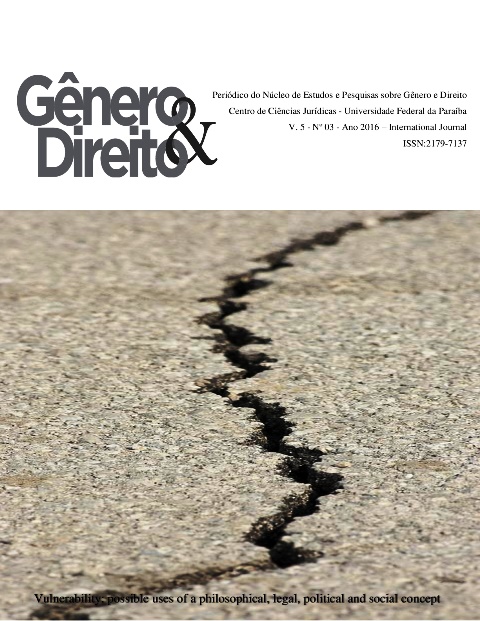DIPENDENZA
Palavras-chave:
Dependency, Disability Studies, inevitable human dependency, managed dependenceResumo
Although dependence on others allows for the sine qua non of human life in any era, there are historical, ideological and structural reasons why people often refuse to acknowledge this unavoidable fact. This refusal is evident with respect to disability, being self-sufficiency, self-reliance and self-determination – connected to able-bodiedness – the only desirable state of persons in a liberal society. The Author focuses on inevitable human dependence in order to pinpoint the importance and unavoidability of dependence for all human beings, as well as to make it visible the experience of people with disabilities. She addresses also some criticisms in disabled people’s activism, who struggle for an independent living instead of opposing the liberal myth of independence.Downloads
Referências
Arneil, Barbara. (2009), “Disability, Self Image and Modern Political Theory”, Political Theory, 37: 218-242.
Baltes, Margret M. (1995), “Dependency in Old Age: Gains and Losses”, Current Directions in Psychological Science, 4: 14-19.
Crewe, Nancy M. e Irwing, K. Zola. (1983), Independent Living for Physically Disabled People. London: Jossey-Bass.
Davis, Lennard J. (2007), “Dependency and Justice”, Journal of Literary Disability, I, 2: 1-4.
De Jong, Gerben (1983), “Defining and Implementing the Independent, Living Concept”, in Crewe e Zola (eds.), Independent Living for Physically Disabled People, San Francisco: Jossy-Bass: 4-27.
Fine, Michael e Caroline, Glendinning. (2005), “Dependence, Independence or Interdependence? Revisiting the Concepts of ‘Care’ and ‘Dependency’”, Ageing and Society, 25: 601-621.
Fineman, Martha A. (1995), The Neutered Mother, the Sexual Family and Other Twentieth Century Tragedies. New York: Routledge.
Fraser, Nancy e Linda, Gordon (1994), “A Genealogy of Dependency: Tracing a Keyword of the U.S. Welfare State”, Signs, 19: 309-336.
Hilde, Lindemann (2001), Damaged Identities: Narrative Repair. Ithaca, NY: Cornell University Press.
Kittay, Eva F. (1999), Love’s Labor: Essays in Women, Equality and Dependency. New York: Routledge, 1999.
Kittay, Eva F. (2003), “Disability, Equal Dignity and Care”, Concilium: International Journal of Theology, 105: 105-115.
MacIntyre, Alasdair (1997), Dependent Rational Animals: The Virtue of Dependence and the Virtue of Acknowledging Dependence, Berkeley: University of California Press.
Morris, Jenny (2004), “Independent Living and Community Care: A Disempowering Framework”, Disability and Society, 19: 427-442.
Morris, Jenny (2011), “Rethinking Disability Policy”, speech November 2011, accessed May 8, 2012, in http://www.youtube.com.
Oliver, Michael (1989), “Disability and Dependency: a Creation of Industrial Societies”, in Barton Len (ed.), Disability and Dependency, London: Falmer Press: 6-22.
Shakespeare, Tom (2006), Disability Rights and Wrongs, London: Routledge.
Weicht, Bernhard (2010), “Embracing Dependency: Rethinking (In)dependence in the Discourse of Care”, Sociological Review, 58: 205-224.
Zola, Irving K. (1988), “The Independent Living Movement: Empowering People with Disabilities”, Australian Disability Re

